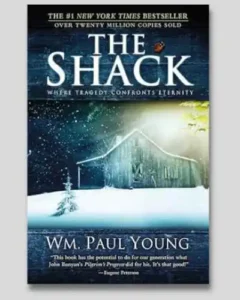The Shack is one of the most impactful novels of the 21st century. Written by William P. Young and published in 2008, the book quickly became a global bestseller.
With 240 pages that blend fiction, drama, and spirituality, it offers a deeply moving narrative.
Although classified as Christian fiction, its universal message resonates with people from diverse religious and philosophical backgrounds.
The story follows Mackenzie Allen Phillips, known as Mack, a man grappling with the devastating loss of his youngest daughter, Missy, who was brutally murdered during a family trip.
The turning point comes when Mack receives a mysterious letter, seemingly written by God, inviting him to return to the shack where his daughter’s remains were found.
At the shack, Mack encounters figures representing the Holy Trinity: Papa (a loving African-American woman embodying God the Father), Jesus (a humble carpenter), and Sarayu (an Asian woman representing the Holy Spirit).
Over one weekend, Mack embarks on a spiritual and emotional journey, confronting his deepest pain, questioning his beliefs, and discovering a new perspective on faith, forgiveness, and the purpose of life.
..
..
Analysis of the Central Idea
At its core, The Shack asks a universal question: how can we find purpose and redemption amidst profound suffering?
The story serves as a metaphor for humanity’s struggle with pain and the reconciliation with God, especially when faith seems inadequate to explain life’s tragedies.
William P. Young uses the shack as a symbol of the darkest places in the human soul – where we bury our traumas, fears, and resentments.
For Mack, this space is both literal and metaphorical: the shack is where he lost his daughter and where his faith was shaken.
The representation of the Holy Trinity is one of the book’s most innovative and, for some, controversial aspects.
By portraying God as a nurturing woman, Young challenges traditional religious stereotypes.
Jesus, depicted as a humble carpenter, guides Mack with simplicity and compassion. Sarayu, the Holy Spirit, personifies intuition and spiritual transformation.
The book’s central idea asserts that true healing comes from accepting God’s unconditional love.
This love does not promise the absence of pain but assures divine presence amid challenges.
Young also explores the concept of free will, explaining that evil is a consequence of human choices rather than divine punishment.
Another powerful message is the importance of forgiveness. Mack faces the daunting task of forgiving not only his daughter’s killer but also himself for harboring guilt that isn’t his to bear.
The narrative demonstrates that forgiveness isn’t for the offender’s benefit but as a means of emotional liberation for the one forgiving.
..
..
Applying the Lessons to Real Life
The lessons in The Shack can be practically applied to various aspects of everyday life.
Below are the key takeaways and their real-life applications:
..
1. Forgiveness Is About Freedom, Not Forgetting
Forgiveness is a cornerstone of the story. Young teaches that forgiving is a deliberate choice to prevent anger and resentment from consuming one’s life.
This is particularly relevant in family and interpersonal contexts. When you forgive, you don’t condone the wrongdoing but release the emotional burden it creates.
Practical Example: Someone who has experienced betrayal in a relationship may not forget what happened, but choosing to forgive can help them move forward and lessen the trauma’s emotional weight.
..
2. Embrace Vulnerability as Part of the Human Experience
Mack is forced to revisit the site of his deepest pain – the shack – to begin his healing process.
This reflects the necessity of facing fears rather than avoiding them.
Practical Example: Seeking therapy or joining support groups can help individuals confront past traumas and facilitate healing.
..
3. Recognize Purpose in Suffering
Though painful, suffering can serve as a catalyst for spiritual and emotional growth.
In The Shack, God explains that while He doesn’t cause pain, He can use it to promote transformation.
Practical Example: Losing a job may lead someone to pursue entrepreneurship or a new career that aligns more closely with their values.
..
4. Redefine Spirituality
The book invites readers to abandon rigid religious views and embrace spirituality centered on love and a personal connection with the divine.
Practical Example: This can manifest through daily practices like meditation, prayer, or moments of gratitude, regardless of religious affiliation.
..
5. The Power of Unconditional Love
God, portrayed as Papa, emphasizes love without conditions, transcending human errors, judgments, or expectations.
Practical Example: Practicing unconditional love in family relationships can strengthen bonds and create a safe, supportive environment.
…
..
Similar Concepts and Comparisons
The Shack shares themes with other literary and spiritual works. Here are some comparisons to contextualize the book:
..
1. “The Purpose Driven Life” (Rick Warren)
Both books explore the relationship with God, but while The Shack uses a fictional narrative, The Purpose Driven Life is a practical guide to finding meaning in life.
..
2. “The Alchemist” (Paulo Coelho)
Like The Shack, Coelho’s work uses a metaphorical journey to address universal themes such as faith, destiny, and self-discovery.
..
3. “The Four Agreements” (Don Miguel Ruiz)
Though less religious, Ruiz’s book also challenges limiting beliefs and encourages practices that foster emotional freedom and growth.
..
4. Biblical Passages
The messages in The Shack align with many biblical scriptures, such as Psalm 23 (“Even though I walk through the valley of the shadow of death, I will fear no evil”) and John 3:16 (“For God so loved the world…”).
These comparisons highlight how The Shack resonates with works promoting self-awareness and a more inclusive view of spirituality.
..
..
Contemporary Relevance of the Book
Since its publication, The Shack has remained relevant. In a world where tragedies and uncertainties are constant, the book offers a perspective of hope and renewal. It speaks to the universal need for meaning, healing, and spiritual connection.
The book’s questioning of religious dogmas and its portrayal of a more inclusive God appeal particularly to those who feel disconnected from traditional religious institutions.
In an era of increasing interest in individualized spirituality, Young’s approach provides a comforting alternative.
Additionally, the work addresses mental health themes. By exploring grief, forgiveness, and reconciliation, The Shack connects with readers dealing with depression, anxiety, and trauma.
..
..
Conclusion and Recommendation for Reading
The Shack is a unique work that combines elements of fiction, spirituality, and drama to explore universal issues in an accessible and emotionally impactful way.
William P. Young challenges conventional perceptions of God and spirituality, presenting a model that is more inclusive and compassionate. The narrative captivates readers while offering profoundly transformative lessons.

- Title: The Shack
- Author: William P. Young
- Year of Publication: 2008
- Publisher: Windblown Media
- Number of Pages: 256
- Genre: Psychology/Behavioral Economics
..
..
Why You Should Read The Shack
You should read The Shack because it addresses universal questions everyone faces: the purpose of suffering, the importance of forgiveness, and the search for meaning.
This book is more than just a story; it is a tool for reflection, healing, and transformation.
If you are seeking answers to personal dilemmas or wish to strengthen your spirituality in a practical way, The Shack offers lessons that can be applied to your life.
Its message of unconditional love, reconciliation, and hope makes it a must-read for anyone on a journey of self-discovery and spiritual growth.
..
..

Andrea Moura
Literary Critic and Columnist for the Book Review Blog
